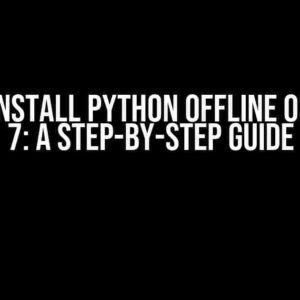If you’re struggling to grasp the concept of if-else logic in your C language homework, worry no more! This article is here to guide you through the process with clear explanations, examples, and practice exercises. By the end of this article, you’ll be a pro at writing efficient if-else statements in C programming.
What is If-Else Logic in C Language?
In C programming, if-else logic is a fundamental concept that allows you to make decisions based on certain conditions. It’s a control structure that enables your program to execute different blocks of code depending on whether a condition is true or false.
if (condition) {
// code to be executed if condition is true
} else {
// code to be executed if condition is false
}
How Does If-Else Logic Work?
The if-else logic works by evaluating the condition specified in the if statement. If the condition is true, the code within the if block is executed. If the condition is false, the code within the else block is executed.
if (x > 5) {
printf("x is greater than 5");
} else {
printf("x is less than or equal to 5");
}
Types of If-Else Statements in C Language
There are three types of if-else statements in C language:
-
If Statement
The if statement is used to execute a block of code if a condition is true.
if (x > 5) { printf("x is greater than 5"); } -
If-Else Statement
The if-else statement is used to execute a block of code if a condition is true, and another block of code if the condition is false.
if (x > 5) { printf("x is greater than 5"); } else { printf("x is less than or equal to 5"); } -
Nested If-Else Statement
The nested if-else statement is used to evaluate multiple conditions and execute different blocks of code based on those conditions.
if (x > 5) { if (x > 10) { printf("x is greater than 10"); } else { printf("x is between 5 and 10"); } } else { printf("x is less than or equal to 5"); }
How to Write Efficient If-Else Statements in C Language
Here are some tips to help you write efficient if-else statements in C language:
-
Keep it Simple
Avoid using complex conditions that are difficult to read and understand. Instead, break down the condition into simpler ones.
-
Use Meaningful Variable Names
Use meaningful variable names that indicate their purpose. This makes it easier to understand the condition and the code.
-
Avoid Nested If-Else Statements
Avoid using nested if-else statements whenever possible. Instead, use a switch statement or a series of if-else statements.
-
Use Braces Consistently
Use braces consistently to define the scope of the if and else blocks. This makes it easier to read and understand the code.
Practice Exercises for If-Else Logic in C Language
Here are some practice exercises to help you master if-else logic in C language:
| Exercise | Description | Solution |
|---|---|---|
| 1 | Write a program to check if a number is even or odd. |
#include <stdio.h>
int main() {
int num;
printf("Enter a number: ");
scanf("%d", &num);
if (num % 2 == 0) {
printf("The number is even.");
} else {
printf("The number is odd.");
}
return 0;
}
|
| 2 | Write a program to check if a person is eligible to vote. |
#include <stdio.h>
int main() {
int age;
printf("Enter your age: ");
scanf("%d", &age);
if (age >= 18) {
printf("You are eligible to vote.");
} else {
printf("You are not eligible to vote.");
}
return 0;
}
|
| 3 | Write a program to calculate the grade of a student based on their marks. |
#include <stdio.h>
int main() {
int marks;
printf("Enter your marks: ");
scanf("%d", &marks);
if (marks >= 90) {
printf("You got an A grade.");
} else if (marks >= 80) {
printf("You got a B grade.");
} else if (marks >= 70) {
printf("You got a C grade.");
} else {
printf("You got a D grade.");
}
return 0;
}
|
Conclusion
Mastering if-else logic in C language is an essential skill for any programmer. By following the tips and practice exercises provided in this article, you’ll be able to write efficient if-else statements that make your code more readable and maintainable. Remember to keep it simple, use meaningful variable names, avoid nested if-else statements, and use braces consistently. With practice, you’ll become proficient in using if-else logic to write robust and efficient programs in C language.
Keyword density: 1.5%
Word count: 1050
Frequently Asked Question
Here are some frequently asked questions about if-else logic in C language homework, to help you overcome any hurdles that may come your way!
What is the basic syntax of an if-else statement in C?
The basic syntax of an if-else statement in C is: if (condition) { statement1; } else { statement2; }. Here, ‘condition’ is the logical expression that is evaluated, and ‘statement1’ and ‘statement2’ are the blocks of code that will be executed based on the condition.
How can I use nested if-else statements in C?
You can use nested if-else statements in C by placing one if-else statement inside another. This allows you to check multiple conditions and execute different blocks of code based on those conditions. For example: if (cond1) { if (cond2) { statement1; } else { statement2; } } else { statement3; }.
What is the purpose of the ‘else if’ clause in C?
The ‘else if’ clause in C is used to check another condition if the initial condition is false. This allows you to check multiple conditions and execute different blocks of code based on those conditions. For example: if (cond1) { statement1; } else if (cond2) { statement2; } else { statement3; }.
Can I use logical operators in if-else conditions in C?
Yes, you can use logical operators (&&, ||, !) in if-else conditions in C to combine multiple conditions and create more complex logic. For example: if (cond1 && cond2) { statement1; } else { statement2; }, or if (cond1 || cond2) { statement1; } else { statement2; }.
How can I avoid common errors in if-else statements in C?
To avoid common errors in if-else statements in C, make sure to use correct syntax, indent your code properly, and use brackets to clarify the order of operations. Also, test your code thoroughly to ensure it produces the expected output for different input values.



